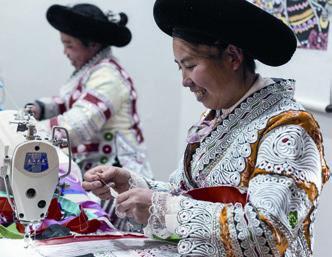Vision for the Globe
By Ronnie Lins

Well-structured planning with consistent policies and achievable objectives is a necessary condition for the success of any nation. China is now a country with a governance system whose planning, goals and actions are considered a worldwide success benchmark.
President Xi Jinping made an important contribution to the world by sharing his knowledge and ideas through three books collecting his thoughts on the governance of China. Speeches, lectures, written instructions and letters presented by the president over the period from November 2012 to January 2020 are included in the three volumes.
It is worth mentioning that due to their importance, some themes are present in all three of Xis books, and are updated according to changes in context.
Poverty elimination, high-quality development and a community with a shared future for humanity are among the main themes in Xi Jinping: The Governance of China Volume III. These topics are of great value to those who are not aware of the reasons behind Chinas success.
An incredible feat
In Volume III, the section about poverty elimination and a moderately prosperous society occupies a very prominent position.In a speech delivered at the Seminar on Targeted Poverty Elimination on February 12, 2018, Xi said, “We have produced a raft of major strategies for the fight against poverty on all fronts. This is a fight of unprecedented intensity, scale, and influence. But we have made decisive progress, significantly improving the working and living conditions of poor areas and poor people, and in so doing we have written a new chapter in the history of the fight against poverty.”
Indeed, Chinas struggle to eliminate poverty was a historic deed that improved the lives of hundreds of millions of Chinese people.
According to the white paper China and the World in the New Era published in September 2019 by the State Council Information Office, “Chinas rural population living under the current poverty line decreased from 770 million in 1978 to 16.6 million in 2018, and Chinas rural poverty incidence dropped from 97.5 percent to 1.7 percent, down by 95.8 percentage points. This is an outstanding achievement in the history of poverty reduction in the world.”
From 2018 to 2020, Chinas remaining rural poor were lifted out of poverty. In doing so, China has managed to fulfill a promise that, for the whole world, would be unimaginable. Many wonder how this was possible. The answer could be found in the speech made by Xi in February 2018, summarized as follows: The process started with the promotion of rapid development in poor areas, benefited from the formation of a strong synergy of all social forces, and was further facilitated by the establishment of an institutional structure with Chinese characteristics to fight poverty.
From the perspective of revenue distribution, high-quality development implies better opportunities for investors, companies and employees. In terms of the macroeconomic cycle, it provides a guarantee for the regular cycle of production, circulation and distribution.
In short, China entering the stage of high-quality development means its shift toward optimizing economic performance.
A shared future
In his speech at the closing ceremony of the Seminar on Global Governance co-hosted by China and France in Paris on March 26, 2019, Xi said, “As a French proverb goes, every man is the architect of his own fate. All countries need to demonstrate a strong commitment to their global responsibilities in the face of daunting global challenges. Indeed, they need to determine a decisive direction for humanity at this juncture. We must take action instead of simply watching as bystanders, and endeavor to shape the future of humanity.”
It is a fundamental issue for the world to rethink its way of facing significant global challenges and to strengthen the bonds of solidarity among all nations.
The emergence of COVID-19 exposed weaknesses of the current global governance system, in links between nations. Decisionmaking through multilateralism, if it were well consolidated, would help alleviate the damage caused by the pandemic.
Global governance should be made through consensus between people from different nations, of different beliefs and cultures. Also, mutual trust, dialogue and shared planning should be brought to country-specific issues or problems that affect the whole international community.
There are different priority issues for developed and developing countries. However, there are global issues such as the fight against COVID-19 and preserving the environment that involve all countries and demand global concerted efforts. Cooperation and extensive consultation are the only correct path for the common good.
Xi Jinping: The Governance of China Volume III is a must-read for those who want to gain a deeper understanding of the secrets of Chinas success, whether they are government officials, managers, scholars, students, or any other people who believe in building a better world. However, as this book shows, building a better world can only be possible through coherent planning, better economic development and sharing of ideas and actions by all countries. BR

